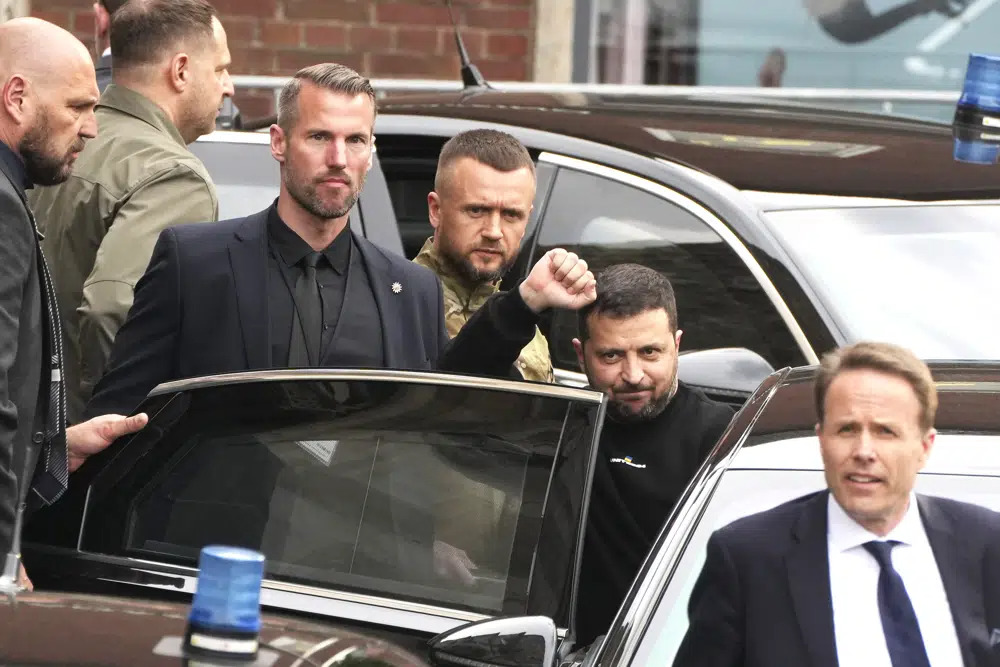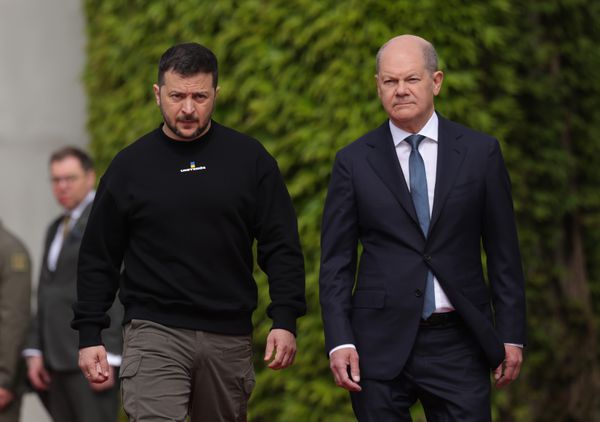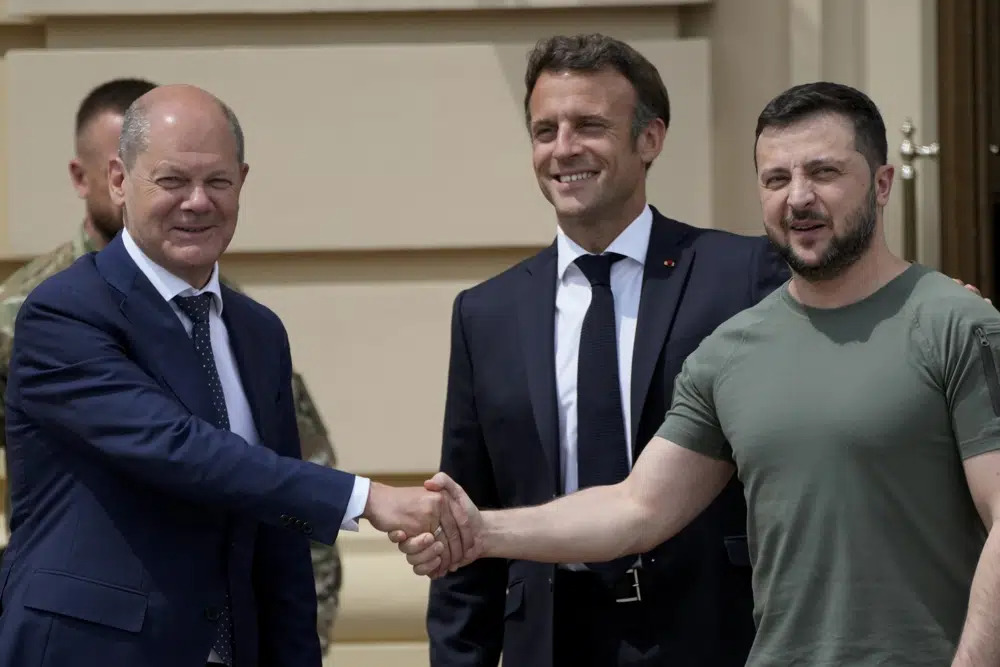WORLD
‘We’re at your side,’ Italian president tells Zelenskyy in Rome before Ukraine leader meets pope
Ukrainian President Volodymyr Zelenskyy, in Rome before talks on Saturday with Pope Francis at the Vatican, received assurances from Italian leaders of continued military and other aid as his country fights to liberate itself from Russia’s military invasion launched last year.
Francis recently said that the Vatican has launched a behind-the-scenes initiative to try to end the war launched last year by Russia.
In a tweet, sent shortly after his arrival in the Italian capital late Saturday morning, Zelenskyy cited his schedule of meetings with Francis, Italian President Sergio Mattarella and Italian Premier Giorgia Meloni. ” An important visit for approaching victory of Ukraine! ” Zelenskyy tweeted.
When Zelenskyy arrived at a military airfield at Rome’s Ciampino airport, Italian Foreign Minister Antonio Tajani was on hand to greet him. Tajani told reporters that Italy will continue to support Ukraine “360 degrees” and press for a just peace, one that safeguards Ukraine’s independence.
Italian Premier Giorgia Meloni staunchly backs military and other aid for Ukraine.
But while her far-right Brothers of Italy party fiercely champions the principle of national sovereignty, Meloni has had to contend with leaders of two coalition partners who have openly professed for years their admiration for Russian President Vladimir Putin. Coalition ally Silvio Berlusconi, a former premier, has boasted of his friendship with Putin, while another government ally, League leader Matteo Salvini, has questioned the value of economic sanctions against Russia.
Zelenskyy began his official meetings by calling on Mattarella at the presidential Quirinale Palace.
“We are fully at your side,″ Mattarella told Zelenskyy as he welcomed him. Later, after their meeting, presidential palace sources said Mattarella assured his guest that Italy would continue supporting Ukraine militarily and financially, as well as with reconstruction and humanitarian aid, in both the short and long term.
Since the war began, Italy has furnished about 1 billion euros ($1.1 billion) in military and financial aid, as well as humanitarian assistance.
At his next stop, the premier’s office, Meloni and Zelenskyy embraced in the palace courtyard, before beginning their closed-door talks.
Zelenskyy is believed to be heading to Berlin next. Zelenskyy’s exact schedule hadn’t been publicly announced because of security concerns, and the Vatican only confirmed a papal meeting shortly before the Ukrainian president’s plane touched down.
Italian state radio reported that as part of protective measures, a no-fly zone was ordered for Rome skies and police sharpshooters were strategically placed on high buildings.
Meloni met with Zelenskyy in Kyiv, shortly before the anniversary of Russia’s full-scale invasion on Feb. 24, 2022.
Francis, who is eager for peace, last met with the Ukrainian leader in 2020.
The pontiff makes frequent impassioned pleas on behalf of Ukraine’s “martyred” people, in his words.
At the end of April, flying back to Rome from a trip to Hungary, Francis told reporters on the plane that the Vatican was involved in a behind-the-scene peace mission but gave no details. Neither Russia nor Ukraine has confirmed such an initiative.
He has said he would like to go to Kyiv, the Ukrainian capital, if such a visit could be coupled with one to Moscow, in hopes a papal pilgrimage could further the cause of peace.
Last month, Ukraine’s prime minister met with Francis at the Vatican and said he asked the pontiff to help Ukraine get back children illegally taken to Russia during the invasion.
The German government, meanwhile, said it was providing Ukraine with additional military aid worth more than 2.7 billion euros ($3 billion), including tanks, anti-aircraft systems and ammunition.
The announcement Saturday came as preparations were underway in Berlin for a possible first visit to Germany by Zelenskyy since Russia invaded his country last year.
Defense Minister Boris Pistorius said Berlin wants to show with the latest package of arms “that Germany is serious in its support” for Ukraine.
“Germany will provide all the help it can, as long as it takes,” he said.
OTHER DEVELOPMENTS:
— Some Ukrainian units continue to push forward near Bakhmut, the commander of Ukraine’s land forces said Saturday, just a day after Ukrainian commanders said their troops recaptured territory at the scene of the war’s longest and bloodiest battle. “The defensive operation in the Bakhmut area continues. Our soldiers are moving forward in some sectors of the front, and the enemy is losing equipment and manpower,” Oleksandr Syrskyi wrote in a Telegram update.
— Russian shelling on Saturday wounded at least seven civilians in Ukraine’s south and northeast, regional Ukrainian officials said. Two women, a man and a teenage boy suffered wounds as Russian forces shelled the village of Khatnie, in the northeastern Kharkiv region, the local prosecutor’s office said.
— Shelling also hit the center of Huliaipole, a town in the southern Zaporizhzhia province, and wounded a civilian, presidential aide Andriy Yermak said. Two others civilians were hurt in the village of Chornobaivka, in the neighboring Kherson region, another official said.
— A “massive” Russian barrage overnight damaged an energy facility in Ukraine’s western Khmelnytskyi region, the Ukrainian energy ministry said Saturday morning. It added that power supply in the region wasn’t affected. The mayor of the regional capital said that 11 civilians were wounded or injured overnight as a result of a Russian missile strike, He added that “hundreds” of residential buildings in the city were also damaged in the strike.
— Russian forces on Friday and overnight resumed their shelling of Ukraine’s northeastern Kharkiv region, killing a civilian, local Gov. Oleh Syniehubov reported on Telegram on Saturday. Four civilians were killed over the same period in Ukraine’s front-line Donetsk province in the east, its Gov. Pavlo Kyrylenko said Saturday.
— Russian forces overnight launched at least 21 Iranian-made Shahed drones at Ukrainian territory, 17 of which were shot down, Ukraine’s air force said Saturday. One of the drones hit unspecified “infrastructure facilities” in the western Khmelnytskyi region, the update said in a likely reference to the energy facility in the province that was damaged in the nightly strike, according to Ukraine’s energy ministry.
— Russian shelling overnight wounded three civilians in the southern Ukrainian city of Mykolaiv, the mayor said Saturday. One person was hospitalized, while the two others were treated on the spot. Multiple fires were reported within the city.
___
Frank Jordans in Berlin, Joanna Kozlowska in London, and Gianfranco Stara in Rome, contributed to this report.
Asia Pacific
China earthquake death toll rises to 149, two still missing after a week.
The death toll from the China earthquake rises to 149, with two still missing after a week. At least 149 people were murdered in a rural location in the northern part of China by one of the most severe earthquakes that China has seen in recent years, according to official media. Two people are still missing following the magnitude-6.2 earthquake a week ago.
The earthquake’s epicenter was located in an area encompassing both the provinces of Gansu and Qinghai. The Hui people of China, a relatively small ethnic minority that stands out for having a distinctive Muslim identity, reside in significant numbers in this area.
The quake’s violent vengeance was felt most strongly in Gansu. Almost 200,000 dwellings were destroyed, and 15,000 homes were on the verge of collapsing, according to reports from Chinese official media. In the province, the severe earthquakes caused 145,000 people to be displaced, and as of December 22, 117 people had been killed and 781 others had been injured.
According to official media, as of 11 p.m. (1500 GMT) on Sunday, 32 people had perished, and two more were still missing in the region of Qinghai, which is located west of Gansu.
The local authorities have determined that the shallowness of the earthquake is responsible for the severity of the damage. The thrust-type rupture during the earthquake and the comparatively soft sedimentary rock in the area contributed to the shakes’ significantly increased destructive power.
Most of the destroyed residences were constructed at an earlier age and were constructed out of brick-wood or earth-wood buildings. Because their load-bearing walls were created from the earth, the local authorities have stated they have inadequate defenses against earthquakes.
In addition, they stated that the tragedy has brought to light the critical need to increase the earthquake resilience of dwellings in rural areas.
Those provinces that are located on the northeastern limit of the tectonically active Qinghai-Tibetan plateau, which includes the majority of Tibet, Qinghai, Gansu, and sections of Xinjiang, as well as the rocky highlands in the western part of Sichuan, are prone to experiencing earthquakes.
In the province of Sichuan, a magnitude-6.6 earthquake occurred ten years ago, resulting in the injuries of over 6,700 people and the deaths of over 160 others. Two thousand seven hundred people lost their lives as a result of the devastating earthquake that struck Yushu, which is primarily Tibetan, in 2010.
AFRICA
The UK paid Rwanda an additional $126 million for the contested migrant plan.
As the tab for Britain’s controversial proposal to relocate asylum seekers to the East African nation continues to increase, the United Kingdom paid Rwanda an extra 100 million pounds ($126 million) in April. This was in addition to the 140 million pounds it had already provided Rwanda.
Even though the Rwanda project is at the core of the policy that British Prime Minister Rishi Sunak is employing to discourage illegal immigration, there have been no individuals sent to Rwanda as of yet due to legal challenges that have taken place since the initiative was introduced in 2022.
After Sunak’s immigration minister resigned this week, the polarizing policy is now regarded as a danger to Sunak’s leadership, which is anticipated to be challenged in the election that will take place the following year.
According to a letter that the British Ministry of the Interior issued on Thursday, the United Kingdom plans to give Rwanda fifty million pounds in addition to the 240 million pounds it has already provided to the East African nation.
The opposition Labour Party criticized the disclosures regarding the rising cost of a scheme that legal experts warned could collapse. Some parliamentarians within Sunak’s party are also expected to express their disapproval of the idea.
A statement by Yvette Cooper, the shadow interior minister for the Labour Party, on social networking site X, said, “Britain cannot afford more of this costly Tory chaos and farce.”
On Friday, however, the newly appointed minister for legal migration, Tom Pursglove, explained what he called the “investment” of 240 million pounds. He stated that once the Rwanda policy was operational, it would reduce the money spent on hosting asylum-seekers in the United Kingdom.
“When you consider that we are unacceptably spending 8 million pounds a day in the asylum system at the moment, it is a key part of our strategy to bring those costs down,” Pursglove explained to Sky News.
Pursglove stated that the money donated to Rwanda would assist in the country’s economic growth and help get the asylum relationship with the United Kingdom up and running.
There was no connection between the money sent to Rwanda and the treaty that the two nations signed on Tuesday, according to the letter from the Ministry of the Interior.
The treaty aims to respond to a ruling by the Supreme Court of the United Kingdom, which stated that the deportation plan would contravene local laws based on international human rights standards.
“The Government of Rwanda did not ask for any payment in order for a Treaty to be signed, nor was any offered,” according to the correspondence.
After Robert Jenrick resigned from his position as immigration minister on Wednesday, Sunak made a plea to fellow Conservative parliamentarians on Thursday to come together in support of his Rwanda proposal. He stated that the emergency legislation the government had drafted to get the scheme up and running did not go far enough.
Africa
UK interior minister travels to Rwanda to resurrect asylum plan.
On Tuesday, the Minister of the Interior of the United Kingdom, James Cleverly, came to Rwanda to sign a new treaty. This was done to circumvent a court judgment that blocked the government’s contentious policy of transferring asylum seekers to the East African nation.
The Rwandan plan is at the core of the government’s attempt to reduce migration, and it is being closely monitored by other nations who are considered to be considering policies that are comparable to Rwanda’s.
In a decision handed down a month ago, the Supreme Court of the United Kingdom stated that such a move would violate international human rights norms embedded in domestic legislation.
Following the decision, the United Kingdom has been making efforts to revise its agreement with Rwanda to incorporate a legally binding treaty that guarantees Rwanda would not remove asylum seekers brought there by the United Kingdom. This is one of the primary concerns of the court.
Several attorneys and charitable organizations have said that it is highly improbable that deportation flights will begin before the election. With a lead of more than ten percentage points in the polls, the opposition Labour Party intends to abandon the Rwanda policy if it is victorious.
A meeting between Cleverly, who arrived in Kigali, the capital of Rwanda, on Tuesday morning, and Vincent Biruta, the country’s Minister of Foreign Affairs, is scheduled to take place to sign the agreement.
“Rwanda cares deeply about the rights of refugees, and I look forward to meeting with counterparts to sign this agreement and further discuss how we work together to tackle the global challenge of illegal migration,” Cleverly says.
The United Kingdom aims to transfer thousands of asylum seekers who came to its beaches without authorization to Rwanda under the plan that was agreed upon the previous year. This discourages migrants from crossing the Channel from Europe in tiny boats.
In exchange, Rwanda has been given an initial payment of 140 million pounds, equivalent to 180 million dollars, along with the promise of additional funds to cover the costs of housing and medical treatment for any deported persons.
THE PRESSURE
A great deal of pressure is being put on Prime Minister Rishi Sunak to reduce net migration, which reached a record high of 745 thousand people in the previous year, with the vast majority of migrants entering through legal channels.
“Stop the boats” is one of the five goals that Sunak has set for his government. The influx of asylum seekers who pay people smugglers for their crossings of the Channel, which frequently take place in boats that are overloaded and not seaworthy, is one of the aims that Sunak has set.
The Supreme Court determined that the Rwanda plan should not be implemented because there was a possibility that refugees who were deported would have their claims incorrectly evaluated or that they would be sent back to their country of origin to suffer persecution.
In the latter part of this week, it is anticipated that the new treaty will be followed by the release of legislation declaring Rwanda a so-called safe nation. This law is intended to prevent legal challenges against the planned deportation flights.
Despite this, this will probably result in a fresh set of political and legal difficulties.
An immigration attorney at Harbottle & Lewis named Sarah Gogan stated that the government’s policy will be challenged due to Rwanda’s history of violations of human rights provisions.
“Rwanda is an unsafe country and this is not a quick fix,” added the politician. “You cannot in a matter of weeks or months reform a country and turn it into one with an impartial judiciary and administrative culture.”
Another “gimmick” was what Yvette Cooper, the spokesperson for the Labour Party’s home affairs department, called the most recent measures proposed by the administration.
Whether or not to design the law in a way that would avoid subsequent legal challenges is still up for debate by the administration.
Several members of the Conservative Party in parliament are putting pressure on the government to incorporate a “notwithstanding” clause into Rwanda’s policy. This clause would disapprove the domestic and international human rights commitments of the United Kingdom regarding Rwanda.
However, some politicians within the ruling party, such as Robert Buckland, have stated that such a move would be “foolish” and undermine the Good Friday Agreement, which is primarily responsible for ending three decades of carnage in Northern Ireland. This is because the European Convention on Human Rights supports the treaty.
-

 Geopolitics & Foreign Policy2 months ago
Geopolitics & Foreign Policy2 months agoTurkey’s Erdogan says he may visit Egypt soon, discuss Gaza patients -media.
-

 Europe3 months ago
Europe3 months agoRussia’s Shoigu accuses the West of seeking to expand the Ukraine war to the Asia-Pacific.
-

 Geopolitics & Foreign Policy2 months ago
Geopolitics & Foreign Policy2 months agoCeasefire takes hold in Gaza ahead of hostage release; aid enters enclave.
-

 Geopolitics & Foreign Policy2 months ago
Geopolitics & Foreign Policy2 months agoRussia deploys new nuclear missile in Kaluga region – RIA
-

 America4 months ago
America4 months agoRepublican US House to hold first Biden impeachment inquiry hearing
-

 Geopolitics & Foreign Policy2 months ago
Geopolitics & Foreign Policy2 months agoChina’s military: US Navy ship ‘illegally’ entered territorial waters
-

 Europe3 months ago
Europe3 months agoZelenskiy, at NATO HQ, asks for weapons to face winter of ‘terror’
-

 Agriculture4 months ago
Agriculture4 months agoIAEA, Japan agree on continuous safety review of Fukushima water











